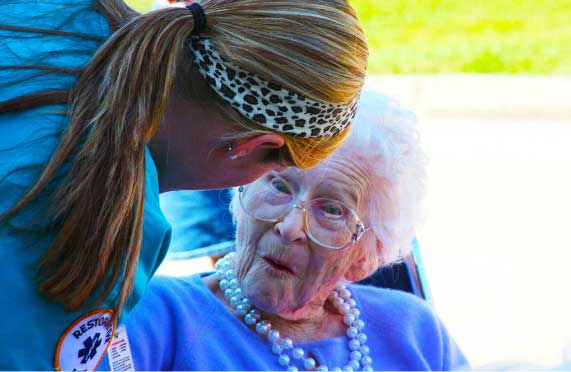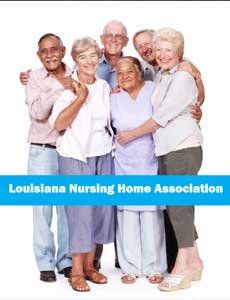Deepwater Chemicals, Inc.
Leader in nursing facility advocacy rated ‘5-star’ by members
When the Louisiana Nursing Home Association was founded in 1957, the nursing home profession was in its infancy. The original LNHA was comprised of owners of small nursing facilities, often located in large, old houses caring for a dozen or so people. At the time, many states didn’t have regulations governing nursing homes – even for essential issues such as fire safety. So the founders came together as a collective body to share their concerns and determine how to approach the common issues that faced them.
LNHA Executive Director Joe Donchess says: “Interestingly, that’s still what we’re doing today – uniting in a professional way to make things better. Obviously, the regulations are tighter now and laws are much more detailed and specific. But our overall mission of providing leadership in long-term care policy and advocacy has stayed the same. As technology evolves, we are looking to do more for our members; sourcing modern innovations to help them run their facilities, and offering valuable additional services.”
Today, the Louisiana Nursing Home Association is a non-profit organization representing more than 270 non-profit and for-profit nursing facilities and assisted living communities that, together, care for approximately 35,000 elderly and disabled individuals each day.
A small but dedicated staff of eight, including two part-timers, keeps LNHA on track. Much credit goes to the Regulatory Director, Education Liaison, Regulations Director, Planning Individual (conferences, etc.), Office Manager/Bookkeeper, and Secretary/ Receptionist for the outstanding success of the association.
LNHA members are well-served in the areas of public policy advocacy, education, professional development, and quality initiatives. As Donchess attests, the increasing membership numbers reflect satisfaction. “When I started with the association in 1986, we represented 211 of 320 nursing facilities in the state. In 2015, it is 254 of 273 nursing facilities along with 16 Assisted Living Facilities. That means we represent more than 90 percent of all the nursing facilities in Louisiana.” The drop in the number of nursing facilities in the state is the result of an initiative spearheaded by LNHA to “rightsize” the profession after a building frenzy took place in the 1980s. A buyback program and a private-room conversion incentive resulted in 5,000 beds being closed.
Some of the minority are members of a second organization called ‘LeadingAge’ – which only serves not-for-profits. Half of their members belong to both groups. Donchess notes, “We are the leader in regulatory affairs, legislative affairs, and education for different disciplines working within the nursing facilities. So when the non-profits see our value, they join us as well.”
LNHA has three tiers of membership:
• Assisted Living Members – 15 at present, hoping to build on that in the future
• Associate Members – primarily vendors of services and products for nursing facilities; 255 Associate members today, up from 211 in 2009
• Professional Members – people who were in the business, i.e. administrators who have since retired but want to stay in the know about the profession
Membership benefits go beyond normal expectations for this type of association. Donchess explains: “First and foremost is regulatory guidance. We continue to watch changes from the federal government in the way nursing facilities have to operate. It’s not as easy as it seems, because surveyors change the way they interpret. We must reach out to federal and state agencies to keep abreast of changing interpretations for different regulations; otherwise facilities will be cited for deficiencies only because an interpretation of a regulation has changed.” LNHA representatives reached out to federal surveyors several years ago, pointing out the “ambush” nature of a changed, but unannounced, interpretation of a regulatory tag. The survey agency was understanding and agreed to share any changed interpretations with the facilities before using them in the survey process.
Advocacy to maintain high legislative awareness is also key. “We follow our state legislative sessions throughout the year to be sure we take a position on bills that are either supportive or oppositional to the Louisiana nursing facilities profession, and try to convince legislators that our position is the correct one,” Donchess adds.
Exclusive LNHA educational programs for members are second to none. In fact, some have been recognized by the state agency as “program of choice” for certain disciplines. These include:
• Resident Activity Director – certification workshops held twice per year
• Social Services Director – certification workshops at least once per year
• MDS (Minimum Data Set) – key process for determining needs of new admission individuals; taught by educators who train the state surveyors
• Director of Nursing Boot Camp – held once per year; baseline lesson for newcomers, refresher course for seasoned professionals
LNHA’s revenue comes primarily from membership dues, but the Association also offers additional programs that benefit both the association coffers and individual members. The Workers’ Compensation Program is a self-insurance program started in 1989, when the price of regular insurance was going through the roof and many insurers were leaving Louisiana.
Donchess says, “We are now one of six homogeneous, self-insurance funds in the state, and we offer workers’ compensation coverage to any member facility that wants to join. We also have a Trust Program for medical malpractice and general liability insurance that started around 2003. All members of LNHA are eligible to participate, and they pay premiums to take part.”
According to Donchess, 60 to 70 percent of members take part in both the Self-Insurance and Trust Programs. “These are benefits that many associations don’t offer; they create a higher benefit level for our members and have worked out quite well for us,” he notes.
“One of the great changes we’re going through now is positioning ourselves to care for people coming out of hospitals; making sure they rehab quickly and appropriately, so they can return home to active lifestyles. The nursing home profession has long been known for being at the end of one’s life cycle and caring for people until they die. The new millennium brought another role to our profession – the provision of post-acute care services to Medicare-eligible people recovering from a hospital stay.”
Payment methodology is also changing. New federal laws that have been passed, go into effect in 2018/19, for a value-based purchasing method that calculates payments based on level of quality, rather than just a fee for a service. Donchess warns, “Anyone operating as a One or Two Level facility on a Five-star rating category had better improve its rating, to ensure payments won’t be affected.”
Since 1992, LNHA has assisted (by invitation) the Louisiana State Emergency Operations Center whenever there is a major emergency or disaster. They are called upon to help make life-saving determinations, such as whether to evacuate a facility or shelter in place. Devastating storms like Hurricane Katrina, as well as man-made catastrophes – train derailments, chemical spills, etc. – could all require their involvement. In a sad nod to the times, LNHA even scheduled an “Active Shooter” seminar for their annual convention this past September, taking into account recent incidents and acting on a heightened desire to get direct training to their membership.
Donchess sums it up clearly: “We are not an industry that builds widgets. We are a profession that services the needs of our most vulnerable elderly and disabled clients. At LNHA, we give our members the knowledge and information, so they can provide the highest quality of care to their residents. That is why we’re in this business and should be our primary goal in life.”
______________________________________
AT A GLANCE
WHO: Louisiana Nursing Home Association
WHAT: Non-profit organization providing leadership in long term care policy and advocacy on behalf of Louisiana’s nursing facilities and assisted living communities.
WHERE: Baton Rouge, Louisiana
WEBSITE: www.lnha.org


